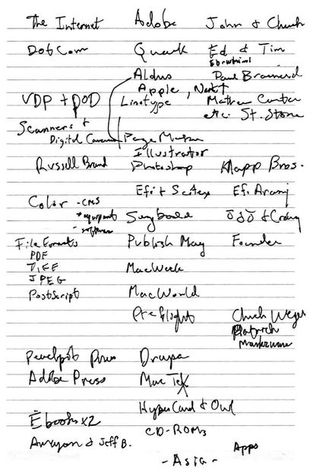June 27th, 2013
I continued to be amazed by contents of the Wired 20th anniversary edition. The full extent by which the history reported in Wired over the past two decades mirrors the most important developments in digital technology is uncanny. The magazine experienced an editorial crisis when in 1998 it became a part of private company Condé Nast, best known for running The New Yorker (and Architectural Digest, GQ, Vanity Fair and Vogue). But it recovered and continues to be one of the top sources of first-class journalism and in-depth analysis of our changing digital world.
 But as I considered the classification topics in my last blog entry I realized that they were mostly aimed at the generalist. The publishing specialist was not addressed. I started to scrawl the topics that I think round out a digital education that’s aimed at a publishing career.
But as I considered the classification topics in my last blog entry I realized that they were mostly aimed at the generalist. The publishing specialist was not addressed. I started to scrawl the topics that I think round out a digital education that’s aimed at a publishing career.
I could easily belabor my reasons for these selections, and in a more formal setting I’d be pleased to do so. But for now I’ll list them by topic and see if this provokes a nod or a shake of the head.
On this site I look first at specific industries and then “Influences and Impacts.” I’ll try the same here.
The sub-set of industries that comprise “the publishing industry” today include:
Advertising
Blogs
Book Publishing
Computer Games
eBooks/eContent
Education
ePaper
Graphic Design
Magazines
Movies
Music
Newspapers
Paper
Printing
Radio
Television
Video
Writing
One of my ongoing dilemmas is the extent to which I would recommend to, for example, a magazine publishing executive that they have a robust grasp of “computer gaming” or “online video”. It’s pretty easy to dismiss these as inessential. On the other hand if the job applicant included this background experience would you think more highly of them than the prospect without any of this deep background?
For “Influences and Impacts” I include:
Copyright
Cultural Industries
Current Economics
Environmentalism
Forecasting & Futurism
Government
Information Explosion
Internet Metrics
Libraries
Literacy
Media Concentration
Social Demographic Issues
Software
I often question whether these influences aren’t better placed in the “Industries” category. Most of these topics are more influential than they are a subset of the publishing industries. For example “literacy” and “media concentration” are clearly influences on the publishing industry rather than subsets of publishing. The one I’m constantly tempted to shove over the Industry wall is “Libraries”. But in the end, libraries are more an influence on the future of publishing. And while they consume as much as 10% of the annual publishing (physical) output, they do so mainly as a customer, loosely organized into an industrial cluster.
This path leads me back to a book I helped write a decade ago: The Columbia Guide to Digital Publishing. Bill Kasdorf was the editor, and his knowledge of publishing is truly encyclopedic.
The easiest way to see the table of contents is via this ACM link. As Maria Bonn points out in her review of the book:
The book’s chapters fall into three broad categories. Some are particularly oriented toward the details of production and discuss specific technologies and methods in detail…. Others are more theoretical…. The chapters in the third category are more issue-oriented… focusing on rights, permissions, and accessibility.
I look back on this book and see the details dusted over by technologies and techniques now past. But the topics remain relevant. Testing a job applicant’s fluency in these topics can serve well as a test of the breadth of knowledge and experience of anyone working in publishing today.